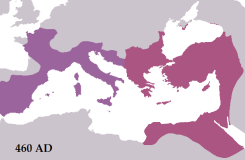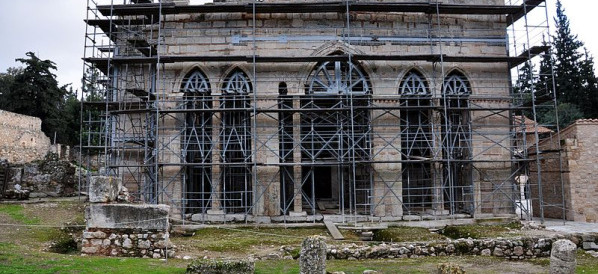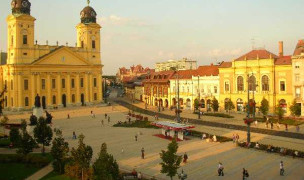 15 Terms
15 TermsHome > Terms > English (EN) > Recentralisation
Recentralisation
In 330, Constantine moved the seat of the Empire to Constantinople, which he founded as a second Rome on the site of Byzantium, a city strategically located on the trade routes between Europe and Asia and between the Mediterranean and the Black Sea. Constantine introduced important changes into the Empire's military, monetary, civil and religious institutions. As regards his economic policies in particular, he has been accused by certain scholars of "reckless fiscality", but the gold solidus he introduced became a stable currency that transformed the economy and promoted development.
Under Constantine, Christianity did not become the exclusive religion of the state, but enjoyed imperial preference, because the emperor supported it with generous privileges. Constantine established the principle that emperors could not settle questions of doctrine on their own, but should summon instead general ecclesiastical councils for that purpose. His convening of both the Synod of Arles and the First Council of Nicaea indicated his interest in the unity of the Church, and showcased his claim to be its head.
The Roman Empire during the reigns of Leo I (east) and Majorian (west) in 460 AD. Roman rule in the west would last less than two more decades, whereas the territory of the east would remain static until the reconquests of Justinian I.
In 395, Theodosius I bequeathed the imperial office jointly to his sons: Arcadius in the East and Honorius in the West, once again dividing Imperial administration. In the 5th century the Eastern part of the empire was largely spared the difficulties faced by the West—due in part to a more established urban culture and greater financial resources, which allowed it to placate invaders with tribute and pay foreign mercenaries. This success allowed Theodosius II to focus on the codification of the Roman law and the further fortification of the walls of Constantinople, which left the city impervious to most attacks until 1204.
To fend off the Huns, Theodosius had to pay an enormous annual tribute to Attila. His successor, Marcian, refused to continue to pay the tribute, but Attila had already diverted his attention to the West. After his death in 453, the Hunnic Empire collapsed, and many of the remaining Huns were often hired as mercenaries by Constantinople.
- Part of Speech: proper noun
- Synonym(s):
- Blossary: Byzantine Empire
- Industry/Domain: Geography
- Category: Human geography
- Company:
- Product:
- Acronym-Abbreviation:
Other Languages:
Member comments
Terms in the News
Billy Morgan
Sports; Snowboarding
The British snowboarder Billy Morgan has landed the sport’s first ever 1800 quadruple cork. The rider, who represented Great Britain in the 2014 Winter Olympics in Sochi, was in Livigno, Italy, when he achieved the man-oeuvre. It involves flipping four times, while body also spins with five complete rotations on a sideways or downward-facing axis. The trick ...
Marzieh Afkham
Broadcasting & receiving; News
Marzieh Afkham, who is the country’s first foreign ministry spokeswoman, will head a mission in east Asia, the state news agency reported. It is not clear to which country she will be posted as her appointment has yet to be announced officially. Afkham will only be the second female ambassador Iran has had. Under the last shah’s rule, Mehrangiz Dolatshahi, a ...
Weekly Packet
Language; Online services; Slang; Internet
Weekly Packet or "Paquete Semanal" as it is known in Cuba is a term used by Cubans to describe the information that is gathered from the internet outside of Cuba and saved onto hard drives to be transported into Cuba itself. Weekly Packets are then sold to Cuban's without internet access, allowing them to obtain information just days - and sometimes hours - after it ...
Asian Infrastructure Investment Bank (AIIB)
Banking; Investment banking
The Asian Infrastructure Investment Bank (AIIB) is an international financial institution established to address the need in Asia for infrastructure development. According to the Asian Development Bank, Asia needs $800 billion each year for roads, ports, power plants or other infrastructure projects before 2020. Originally proposed by China in 2013, a signing ...
Spartan
Online services; Internet
Spartan is the codename given to the new Microsoft Windows 10 browser that will replace Microsoft Windows Internet Explorer. The new browser will be built from the ground up and disregard any code from the IE platform. It has a new rendering engine that is built to be compatible with how the web is written today. The name Spartan is named after the ...
Featured Terms
Monastery of Daphni
Daphni or Dafni, is an 11th-century Byzantine monastery 11 km north-west of central Athens in the suburb of Chaidari, south of Athinon Avenue. It is ...
Contributor
Featured blossaries
Browers Terms By Category
- Economics(2399)
- International economics(1257)
- International trade(355)
- Forex(77)
- Ecommerce(21)
- Economic standardization(2)
Economy(4111) Terms
- Lingerie(48)
- Underwear(32)
- Skirts & dresses(30)
- Coats & jackets(25)
- Trousers & shorts(22)
- Shirts(17)
Apparel(222) Terms
- Capacitors(290)
- Resistors(152)
- Switches(102)
- LCD Panels(47)
- Power sources(7)
- Connectors(7)
Electronic components(619) Terms
- Chocolate(453)
- Hard candy(22)
- Gum(14)
- Gummies(9)
- Lollies(8)
- Caramels(6)




